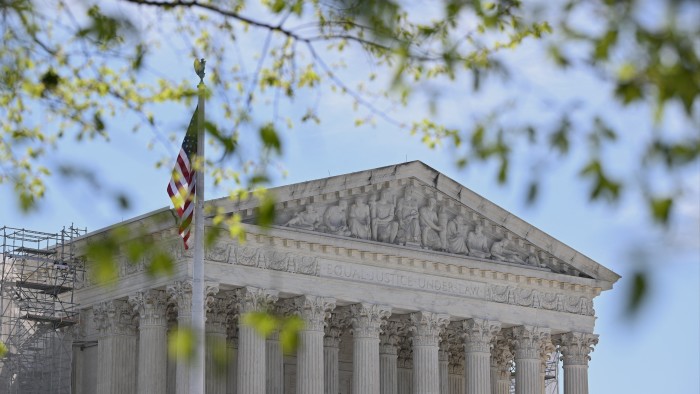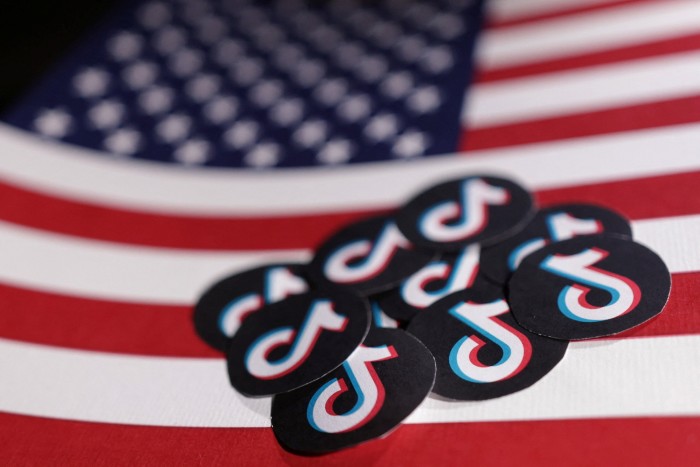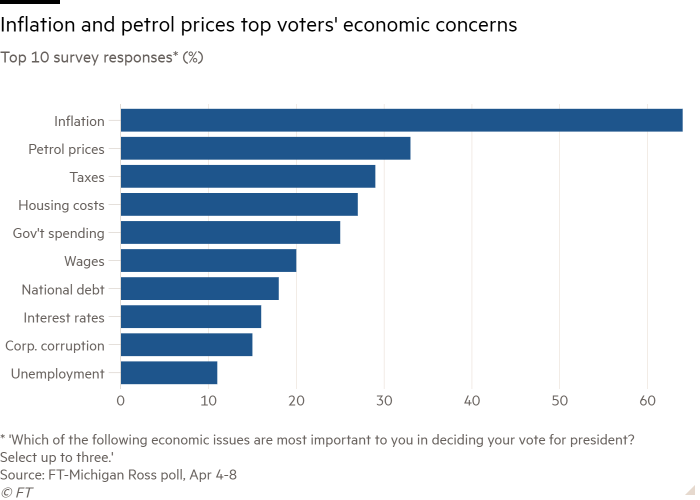Will the Supreme Court rule that Donald Trump is above the law?

Roula Khalaf, Editor of the FT, selects her favourite stories in this weekly newsletter.
This is an onsite version of the US Election Countdown newsletter. You can read the previous edition here. Sign up for free here to get it on Tuesdays and Thursdays. Email us at electioncountdown@ft.com
Good morning and welcome to US Election Countdown. Today we’re chatting about:
Trump’s immunity pitch to the Supreme Court
Should Biden be worried about an interest rate increase?
The president’s petrol priorities
Donald Trump has asked the Supreme Court to grapple with a question that will have huge consequences for the balance of power in the US government: are presidents above the law?
Trump’s lawyers will urge the high court today to take an expansive view of presidential immunity, as Trump seeks a ruling that would make the presidency more like a monarchy of yore [free to read]. Specifically, he wants a shield from federal criminal charges accusing him of trying to overturn the 2020 election. Any ruling would probably affect two other criminal cases he’s facing.
Republican lawmakers and attorneys-general have said such broad presidential immunity is necessary to insulate a president both from the judiciary and partisan prosecutions.
Many legal scholars, historians and advocacy groups, however, have argued that attempts to overturn an election do not constitute “presidential authority” and go against values that are central to US democracy.
Blanket immunity could also have national security implications. A lower court has raised a striking hypothetical: could a president be prosecuted for ordering the military to kill a political rival? Trump’s lawyers seemed to say Congress would need to impeach and convict that president first. The military chain of command could also be thrown into chaos, experts have said.
Amid the Supreme Court’s lurch to the right, chief justice John Roberts will probably aim to gather consensus in an effort to head off accusations of partisanship. There are three Trump-appointed justices on the bench and the court is split 6-3 along conservative-liberal lines.
For Joe Biden’s part, we can expect the president to stay quiet for now, as speaking out about the immunity case could open him up to accusations of politicising the judiciary.
Campaign clips: the latest election headlines

Biden’s campaign will keep using TikTok despite the divest-or-ban law he just signed.
As Biden hopes a robust economy will help him overtake Trump, data released today shows the US economy grew less than expected for the first quarter of 2024, and inflation data was higher than forecast.
Here’s how Evangelical Christians and intelligence chiefs convinced US Speaker of the House Mike Johnson to make a U-turn on Ukraine aid. [Free to read]
Biden as well as Trump and Johnson have weighed in on the arrests of university campus protesters who are against the war in Gaza.
Ex-tabloid boss David Pecker testified at Trump’s “hush money” trial that he had tried to protect the former president from claims of an affair.
JPMorgan boss Jamie Dimon said he’d “love” to be president but he’d have to be anointed. Until then, he’d like the next president to put members of the opposing party in their cabinet.
Behind the scenes
A hot economy during an election year is what presidents dream of, but is this one getting too hot for Biden to handle?
In Biden’s ideal scenario, unemployment would stay near historic lows, price pressures would fall, and the Fed would cut rates at least once before voters hit the polls in November. But chances of a rate cut have sharply decreased as recent inflation data has come in higher than expected — so much so that some traders have started to build up bets of another rate increase.
However, the FT’s acting US economics editor Claire Jones told me that Biden shouldn’t worry too much about the Fed raising rates just yet:
Officials there still believe that, despite some disappointing readings of late, inflation will more likely than not drift down towards their 2 per cent goal, giving them room to cut rates at some point in 2024 — though perhaps a few months later than originally anticipated.
Does this mean Biden can ignore the market noise? Not quite. Investors’ expectations on interest rates matter for voters’ borrowing costs, and the recent reversal has helped push new mortgage rates above 7 per cent.
Datapoints
When Iran launched a barrage of 300 missiles and drones at Israel this month, the world was braced for a shockwave through oil markets. If the Middle East turmoil of the 1970s was to be any guide, an inflationary surge could be enough to unseat a US president.
But because the US now produces so much oil, those fears appeared overblown; petrol prices hardly moved.

On one hand, this is good news for Biden since rising petrol prices are so politically sensitive. Voters are increasingly worried about the potential for prices at the pump to go up. The latest FT-Michigan Ross poll found that 33 per cent of respondents said petrol prices were one of the most important economic issues for them, up from 29 per cent a month earlier.
But the US’s rising power as a net oil exporter also complicates his attempts to court progressive and young voters worried about the environment. About 20 years ago, the US produced about 7mn barrels of petroleum and consumed 21mn a day. Now, the country produces almost 20mn b/d, roughly in line with consumption.

Viewpoints
Republicans have formed a circular firing squad, with Ukraine aid laying bare deep rifts in the party that a snoozing Trump can’t fix, writes Edward Luce.
The Fed faces a tricky call on when to start loosening monetary policy — and central bankers may want to avoid interest rate cuts before the election, says Martin Wolf.
Johnson beat the odds by taming Trump and his hardline Republican supporters on Ukraine aid, notes Jonathan Martin. (Politico Magazine)
Meanwhile, one of those hardliners, representative Marjorie Taylor Greene, was humbled, according to Michelle Cottle. (NYT)
Comments